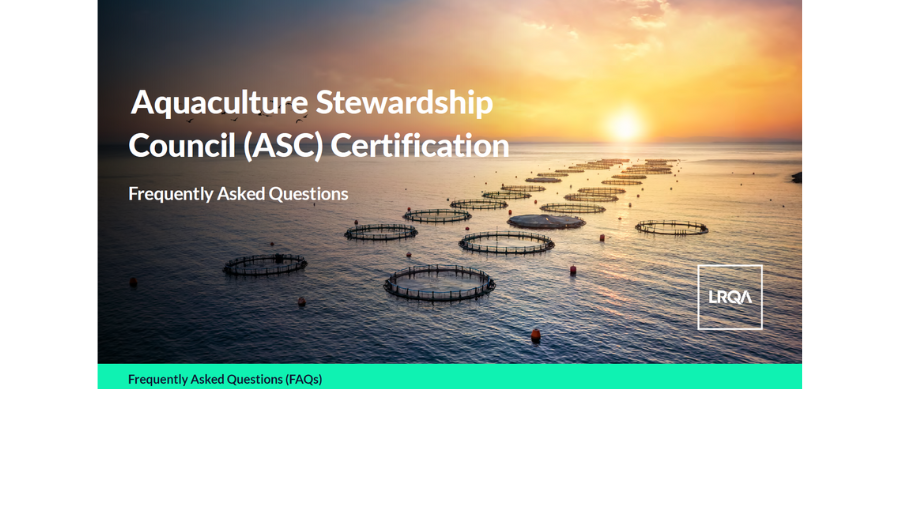Aquaculture Stewardship Council Certification: Comprehensive FAQ Guide for Responsible Seafood Farming
The Aquaculture Stewardship Council (ASC) certification represents a global standard for responsible seafood farming. This certification plays a pivotal role in assuring businesses, retailers, and consumers that aquaculture operations meet exacting environmental, social, and fish welfare criteria. As sustainability increasingly shapes industry practices and consumer preferences, understanding ASC certification is crucial for aquaculture producers and supply chain stakeholders.
What is ASC certification?
The Aquaculture Stewardship Council (ASC) certification is a globally recognised standard for responsibly farmed seafood. It ensures that aquaculture operations adhere to stringent environmental and social criteria, providing assurance to consumers, retailers, and businesses that seafood products are sourced sustainably.
What are the benefits of ASC certification?
ASC certification offers several advantages, including:
- Market access – Certified products are preferred by major retailers and foodservice providers that prioritise sustainability.
- Consumer trust – The ASC label is recognised globally, indicating a commitment to responsible aquaculture practices.
- Improved operational practices – Certification encourages aquaculture farms to adopt environmentally friendly and socially responsible methods.
What is the process for obtaining ASC certification?
The ASC certification process involves several key steps:
- Preparation – The aquaculture operation aligns its practices with ASC standards, addressing areas such as environmental impact, social responsibility, and fish welfare.
- Application – The business applies for certification through an accredited certification body.
- Audit and evaluation – A thorough assessment of the operation’s compliance with ASC standards is conducted, including site visits and stakeholder consultations.
- Certification and ongoing compliance – Once approved, certification is granted, with regular audits to verify continued compliance.
How much does ASC certification cost?
The cost of ASC certification varies depending on factors such as the size and complexity of the operation. While specific costs cannot be provided upfront, LRQA can offer a tailored quote based on your organisation’s needs.
How long does it take to become ASC certified?
The timeframe for obtaining ASC certification depends on:
- The preparation of the aquaculture farm
- The availability of certification bodies
- The complexity of the audit
These factors can all influence the total duration of the certification process.
Which major brands and retailers partner with ASC?
ASC-certified seafood is used by globally recognised brands and retailers, including:
- Walmart – A leading global retailer that prioritises sustainability in its seafood sourcing
- Whole Foods Market – A supermarket chain known for its commitment to high-quality, sustainably sourced products
What does the new ASC Combined Standard mean for currently certified organisations?
Organisations already holding ASC certification will need to transition to the new combined standard once it is officially released.
- The ASC will outline a transition timeline, providing a grace period for certified entities to align their practices with the updated requirements.
- The change will involve retiring the existing species-specific standards, and certified organisations will be required to adapt to the unified criteria.
- Specific dates and transition guidelines will be communicated by ASC to ensure a smooth process.
What is the ASC Combined Standard anticipated for release in May 2025?
The ASC is planning to introduce a Combined Standard, tentatively scheduled for May 2025. This new framework will:
- Replace multiple species-specific standards with a single, harmonised standard
- Streamline certification requirements
- Reduce complexity and improve consistency across aquaculture operations
- Help producers understand and implement requirements more efficiently
How do I start the ASC certification process?
To begin the certification process:
- Contact LRQA for an initial consultation
- Receive detailed insights, a tailored quote, and guidance on the next steps
How does ASC certification fit into a wider seafood sustainability strategy, including human rights due diligence?
ASC certification supports broader sustainability strategies through:
- Human rights due diligence – Risk assessments to identify and mitigate forced labour, modern slavery, and worker exploitation
- Social accountability and ethical audits – Using standards like SA8000 to verify working conditions
- Traceability and supply chain transparency – Ensuring chain of custody controls and ethical procurement
- Compliance with regulations – Including the EU import rules and the UK Modern Slavery Act
- Engagement with NGOs and industry initiatives – Supporting global responsible aquaculture and ethical seafood supply chains
Looking for more in-depth information? Our Aquaculture Stewardship Council (ASC) FAQ Guide is packed with:
- Key certification requirements
- Step-by-step audit process
- Expected timelines and cost considerations
- Details about the 2025 ASC Combined Standard
- LRQA’s role in helping you prepare and succeed
Whether you’re new to ASC certification or looking to optimise your current practices, this guide provides all the insights you need to make informed, strategic decisions.
